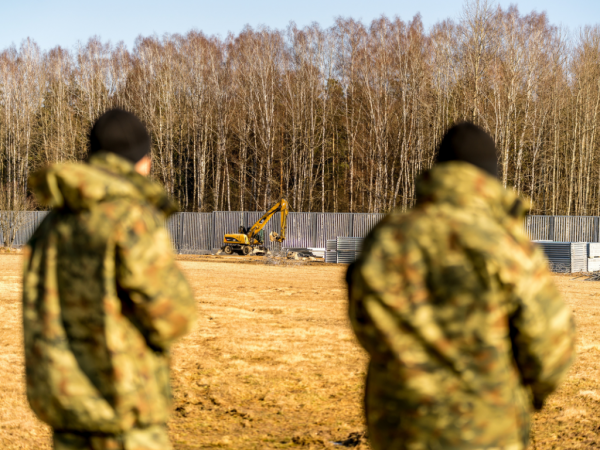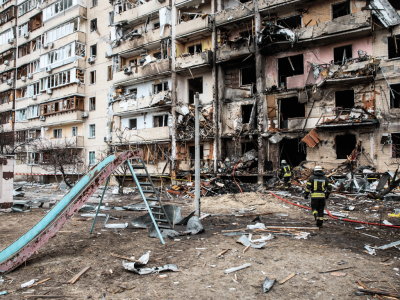
A violation of the ban on entering the border strip and bringing objects across the border with Belarus cannot be penalised under the Code of Administrative Offences. A court in Siemiatycze acquitted a group of humanitarian aid workers. The activists were represented in court by HFHR lawyers. Significantly, the court also noted that the wall is not exactly on the line of the Polish-Belarusian border, but was erected on the Polish side, about 1-2 meters from the border. The activists put things over the fence and placed them directly behind it, i.e. still on the strip of land that is Polish territory.
An attempt to punish for helping
In the winter of 2023, a group of persons provided assistance to migrants on the other side of the wall built on the border with Belarus. This assistance included the provision of food, drinks and clothing. The Border Guard filed charges against these people, accusing them of committing administrative offences, namely disregarding the ban on entering the zone adjacent to the state border, the so-called "border strip", and the ban on bringing objects across the border with Belarus. These prohibitions result from two regulations issued by the Governor of the Podlasie province. In July, the Provincial Administrative Court in Białystok, following a complaint by the Ombudsman, annulled the Governor's regulation banning the passing of objects. The Administrative Court in Białystok found that the governor had exceeded his powers by issuing this measure, but the governor has appealed the ruling, so the judgment is not yet final.
Court: There is a strip of Polish territory behind the wall
Humanitarian aid workers have benefited from the legal assistance offered by the HFHR and the Szpila Collective to all those who have been subjected to repression for their involvement in providing aid in the Polish-Belarusian border region.
The Bielsk-Podlaski District Court’s Criminal Division sitting in Siematycze acquitted four activists. The court was of the opinion that regulations issued by the Province Governor cannot give rise to liability for an offence referred to in Article 54 of the Code of Administrative Offences. According to this provision, sanctions may be imposed for violations of peacekeeping measures effective in public places. The court ruled that the governor's regulations are not peacekeeping measures governing the conduct of individuals in public places. In this respect, the court has already followed the reasoning of other courts in previous decisions.
In addition, the court found that the defendants had not violated the ban on bringing objects across the border line with Belarus. The court noted that the wall does not stand exactly on the border line, but was built on the Polish side of the border, about 1-2 metres away from the actual border. At the same time, the defendants pushed objects over the wall and placed them directly behind it, i.e. still on the strip of land that is Polish territory. The court's findings in this regard are also relevant for the assessment of the situation of persons who are located directly at the border wall and seek international protection. So far, the Border Guard has claimed that these persons are located on Belarusian territory and are therefore not subject to Polish jurisdiction.
The court also emphasised that the governor's regulation is defective, which cannot be ignored, even though the judgment of the Białystok Provincial Administrative Court is not yet final. “This is another court judgement confirming that the Border Guard may not file criminal complaints with the courts for violations of the prohibitions issued by the Governor of the Podlaskie province. It is also important that the court found that a strip of Polish territory under the jurisdiction of the Polish authorities extends beyond the wall,” says Jarosław Jagura, a lawyer who works with the HFHR and defended the activists.
“I am very pleased about another court ruling that declares the criminalisation of assistance at the Polish-Belarusian border to be inappropriate and unfounded. My portfolio of judgments is gradually growing and almost all of them are favourable to me and the people who have joined me in helping others. Since the beginning of the crisis, Polish law enforcement authorities have tried to have us convicted for providing humanitarian aid to refugees in Polish forests. Fortunately, the courts are preventing these attempts at criminalisation. I am glad that the court emphasised in statement of grounds of the judgment that the wall is not on Poland's border, but within its territory. This clearly shows that the people directly at the wall, although they are on the other side of the wall, are actually in Poland, so they should be able to apply for international protection,” says Marianna, one of the aid activists.
“Of course I am glad that I was acquitted, but at the same time I am worried and sad that I had to stand trial at all. Nobody should be penalised for providing humanitarian aid. Having to explain in court how and why I gave water to a thirsty person seems quite absurd to me. Especially because the same border guard who wanted to punish me would have helped me if I had done the same thing 200 kilometres further, at the Ukrainian border. The judgment in our case is another court decision that shows that what is happening in Podlasie is not only deeply immoral, but also illegal,” adds Marcin, one of the acquitted.
Support for people facing repression because of their involvement in providing assistance on the Polish-Belarusian border
Together with the Szpila Collective, the HFHR offers free legal aid to people who are repressed because of their involvement in providing assistance at the Polish-Belarusian border. We can support any individual or group providing assistance at the border.
If you need our help, please call 785 931 935 (the helpline is operated by the Szpila Collective, in urgent cases the number is available around the clock).
We offer legal support to all persons providing humanitarian aid at the border who
- are detained or searched by uniformed services (police, border guards, military);
- are charged with criminal or administrative offences;
- receive fines, including for violations of no-entry zones;
- who are subjected to intimidation and harassment.


